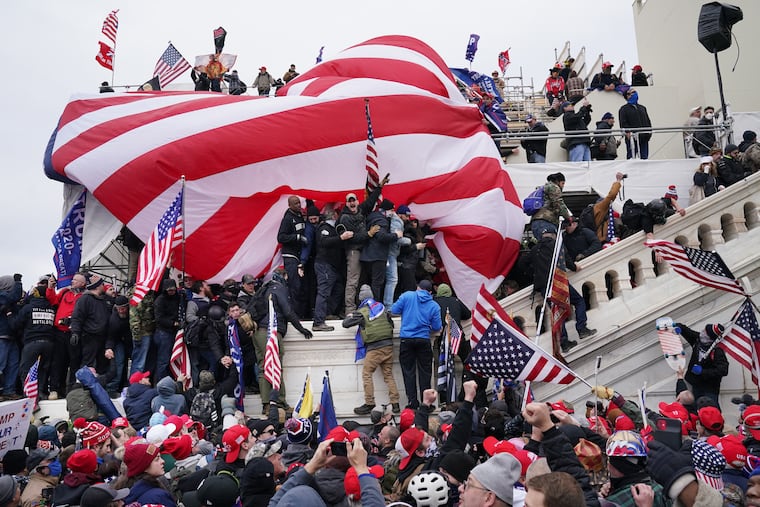A bipartisan Jan. 6 commission would do more than ‘relitigate the past’ | Opinion
The commission’s true power would be to create a record of facts, which is among the most important ways to hold political leaders accountable in America.

This week, the House of Representatives is debating a special committee to investigate the Jan. 6 attack on the U.S. Capitol. The commission, planned to have an equal number of Democrats and Republicans, will investigate the riot and “the interference with the peaceful transfer of power, including facts and causes relating to the preparedness and response of the United States Capitol Police.” The commission will examine the “influencing factors” that produced the attack. That is legislative speak for determining former President Donald Trump’s role in what happened.
Many Americans don’t care. They want to move on, or they consider this another Democratic attempt to besmirch Trump. They think it more important to attack President Joe Biden than to “relitigate the past,” as House Minority Leader Kevin McCarthy explained as the basis for removing Rep. Liz Cheney from a leadership position in the Republican caucus. McCarthy announced Tuesday he opposed the legislation that would create the commission — perhaps unsurprising given that, as Cheney herself has suggested, he is likely to be asked to testify before the commission on Trump’s “state of mind that day.”
» READ MORE: McConnell hits ‘pause’ on Democrats’ effort to create Jan. 6 panel
On that day, as was obvious to anyone who watched or read the news, Trump ramped up a conspiracy theory to end all conspiracy theories: that the election was “stolen” from him. He was speaking of the same election in which Republicans gained House seats, nearly held onto the leadership in the Senate, and won other statewide races — including in Pennsylvania. Despite this, eight of nine Republican members of Congress from Pennsylvania voted to object to the 2020 election results.
Today, in fact, 55% of Republicans believe that the presidential election of 2020 was stolen, per an April Ipsos/Reuters poll. Most Americans believe that wearing masks and taking the vaccine are helpful health measures, but the people who never or rarely wear masks tend to be Trump supporters. So the idea of a bipartisan commission to determine the facts of what happened is a throwback to an earlier era in which people believed there are such things as facts. We already know — to the extent knowing based on actual empirical evidence is a legitimate exercise — that millions of people will dismiss the commission’s findings, as they have dismissed the election itself, as a hoax. Indeed, in the few hearings already held on the Jan. 6 event, Republican members of Congress declared that there was no attack that day, that even if there were an attack it was done by left-leaning actors, and that the people who entered the Capitol that day appeared to be on a “normal tourist visit.”
The commission’s true power, then, would be limited but necessary: to create a record of facts, which is among the most important ways to hold political leaders accountable in America. There are past such records that remain the foundations for our understanding of past events and the extent of public leaders’ actual involvement in misconduct — records such as the Warren Commission’s findings that President John F. Kennedy was killed by a single gunman; the 2020 joint findings of the Senate Intelligence Committee confirming Russian involvement in the 2016 presidential election; the 1973 report of the Senate Select Committee on Presidential Campaign Activities confirming the details of Richard Nixon’s involvement in the Watergate break-in; and Senate investigations of the “Teapot Dome Scandal” that confirmed corruption in the sale of leases for governmental oil reserves in the 1920s.
The commission will “relitigate the past” — but not to persuade the unpersuadable. It will aim to present and share a thorough, factual account, and ideally help develop reforms to prevent something like this from happening again.
If some current and former governmental leaders continue pushing to portray Jan. 6 as anything but the unprecedented attack on Congress that it was, the government itself should try to set the record straight. The second impeachment of Donald Trump was one such effort, but a bipartisan committee has greater promise in restoring the public and future Americans’ confidence in their government and in the veracity of facts. It will be a much-needed reminder of the fact that Trump and his supporters remain entitled to their own opinions, but not to their own facts.
Michael Gerhardt is Burton Craige distinguished professor of jurisprudence at the University of North Carolina and the author of several books, including “Lincoln’s Mentors: The Education of a Leader.”